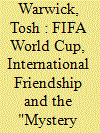|
|
|
Sort Order |
|
|
|
Items / Page
|
|
|
|
|
|
|
| Srl | Item |
| 1 |
ID:
100758


|
|
|
|
|
| Publication |
2010.
|
| Summary/Abstract |
In January 2007, English international soccer star David Beckham announced to a global media that he would be leaving the Spanish giants Real Madrid to join Major League Soccer's (MLS) Los Angeles Galaxy. MLS Commissioner Don Garber feted Beckham as a global sporting icon whose presence attested to America's gradual transformation into a 'Soccer Nation.' However, following LA Galaxy's acquisition, a debate surrounding soccer's previous failure to compete at the highest echelons of American professional sport reappeared. Academic and journalistic commentators identified a number of obstacles-historical, socioeconomic and ideological-that have prevented soccer from gaining a foothold in the United States sporting market and therein becoming a credible adversary to the holy trinity of Gridiron Football, Baseball, and Basketball. This article, drawing upon Ian Hacking's prescriptions for Historical Ontology (2002) and thereby foregrounding issues of identity and power, seeks to analyse the impediments that have marked soccer's development in the United States and that led to the recruitment of Beckham as the sporting celebrity-cum-commercial juggernaut intended to bring MLS to the attention of a mass audience-variegated in terms of class, 'race,' and gender-so coveted by leaders of the organisation.
|
|
|
|
|
|
|
|
|
|
|
|
|
|
|
|
| 2 |
ID:
165779


|
|
|
|
|
| Summary/Abstract |
Article Type: Research Paper Purpose:This article explores the evolution of international bonds between Middlesbrough in the northeast of England and North Korea arising from the participation of the North Korean men's football team at the 1966 FIFA World Cup. Shedding new light on the origins of this example of sporting diplomacy, this research seeks to understand the dynamics of international relations enacted at a local level and highlights the role of key individuals and institutions in facilitating this connection between the town and North Korea into the twenty-first century. Design, Methodology, Approach:Beginning with an assessment of early interactions between Middlesbrough and North Korea, this paper analyzes the way in which the relationship has been articulated and developed across several decades. Drawing upon local authority archives, historic newspaper collections, oral history and private collections, this study brings together hitherto underexplored resources, including North Korean diplomatic correspondence and interviews with the footballers of 1966, to deconstruct the multilayered mechanisms, meanings and motivations that underpin the Middlesbrough-Pyongyang relationship. Findings:Focusing chiefly on the role of British agency in North Korea-UK interactions, this research reveals the combination of local sporting conditions, international relations and individual and institution engagement in constructing bonds between Middlesbrough and North Korea since 1966. In doing so, the article draws out some of the peculiar local, economic and political factors that have shaped and nurtured the sporting, pseudodiplomatic connections between Pyongyang and Teesside. Practical Implications:This study highlights the important role that sport can play in harnessing new international interactions and understandings between peoples from different cultural and political systems. The power of football and bonds created at a local level (in this case Middlesbrough) to help nurture international diplomatic relations and embrace common transnational interests is also considered, as are the limitations of what might be considered a strand or extension of sports diplomacy. Originality, Value:Expanding beyond the existing literature on sports diplomacy, mega events and official interactions between North Korea and the UK, this article utilizes hitherto unpublished historical documentation and new oral testimony to bring a new perspective on the benefits and challenges posed by interactions across international borders facilitated by sport, both at the FIFA World Cup in 1966 and in recent decades.
|
|
|
|
|
|
|
|
|
|
|
|
|
|
|
|
| 3 |
ID:
158147


|
|
|
|
|
| Summary/Abstract |
This article explores the use of sport in the formation of an Israeli cultural (multi-ethnic) identity and its historical and contemporary place in the Palestinian–Israeli conflict. The power of sporting events lies in the fact that the teams represent for their fans an ideology beyond the game itself. Supporting a sports team is a primary form of identity for many people. Highly salient sporting events, which are supercharged with emotion and garner eager interest, are also a venue for achieving political objectives on the local, national, and international levels.
|
|
|
|
|
|
|
|
|
|
|
|
|
|
|
|
|
|
|
|
|